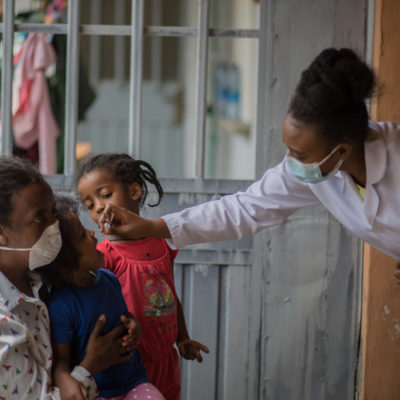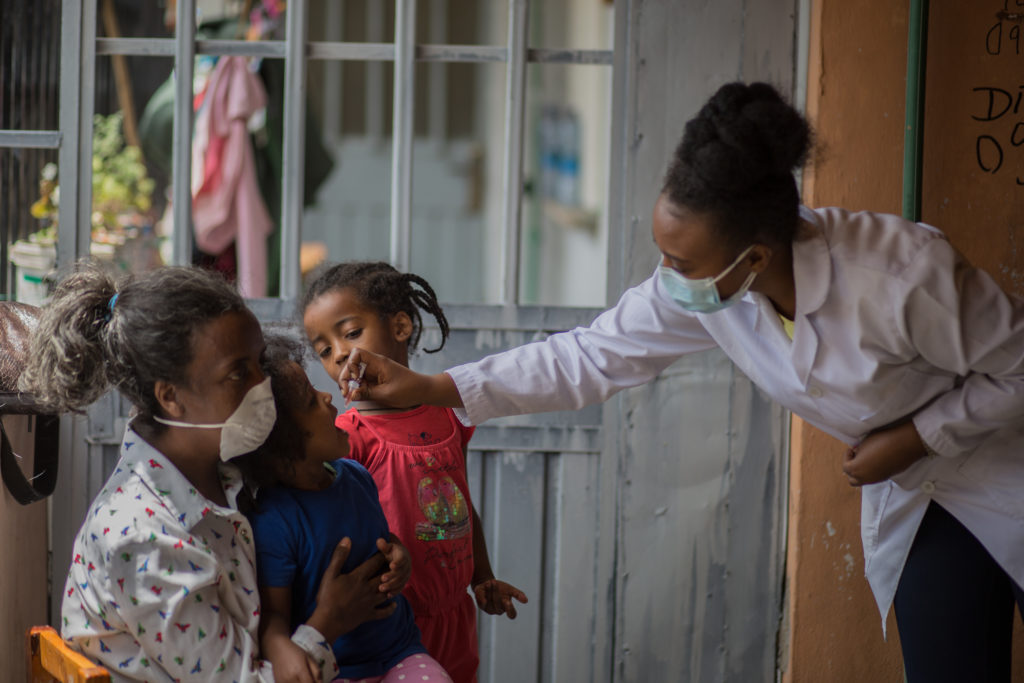Achieving Universal Health Coverage – Health for All by 2030
Dr. Tedros Adhanom Ghebreyesus, the director-general of the World Health Organization said that achieving “health for all” should be put front and center in all development efforts, since “if there is no health, there is nothing.”

“If there is no health, there is nothing.” -Dr. Tedros Adhanom Ghebreyesus, WHO Director-General
Shot@Life advocates and raises awareness for access to lifesaving global childhood vaccines every day, and we have also partnered with Takeda Pharmaceutical Company Limited[ii] to directly support UHC efforts. Through this expanded partnership, Takeda is supporting the enhancement of disease surveillance systems in 14 countries throughout sub-Saharan Africa. Takeda’s commitment is clear in its scope and 550 million Japanese yen donation (more than $5 million USD)[iii] to Shot@Life.
These efforts are critical to achieving Universal Health Coverage as part of the SDGs and providing every child a healthy future.
What is UHC and why is it important?
Achieving UHC means ensuring all individuals and communities can readily access the health services they need–including the full range of essential health services, from health promotion to prevention, treatment, rehabilitation, and palliative care–without suffering financial hardship. UHC is important both from a human rights perspective and from a practical perspective. We know that prevention is cheaper than treatment. Health is an investment, not a cost, and needs to be seen that way.
Around the world, more than 930 million people (around 12% of the world’s population) spend at least 10% of their household budgets to pay for health care. As a result, nearly 100 million people are pushed into extreme poverty simply due to the cost of health services. When countries invest in UHC models, pooled funds from compulsory funding sources (such as mandatory insurance contributions) can help spread the financial risks of illness across the population – alleviating the burden placed on the poor when accessing health care.
However, UHC is not just about health financing. It also encompasses all components of the health system: health service delivery systems, the health workforce, health facilities and communications networks, health technologies, information systems, information systems, quality assurance mechanisms, and governance and legislation.
The role of immunizations in UHC
Immunization lies at the foundation of UHC, and is one of the most successful and cost-effective public health interventions, preventing 2-3 million deaths every year.[iv] Thanks to UNICEF, Gavi, the Vaccine Alliance, and other global health organizations, vaccines can now reach children and families even in the most remote or impoverished areas.[v] And while the cost of health care remains a barrier for other health services, through UNICEF and Gavi’s bulk purchasing of vaccines at below-market rates, immunizations are provided free of charge or at greatly reduced rates to many living in middle and low-income countries.
As a result, immunizations are an important building block and one of the most effective tools for achieving UHC. For one, the existing infrastructure of routine and campaign-immunization programs can be leveraged to provide other basic services–such as maternal and child health services. Additionally, the widespread use of vaccines helps avert the costs entailed with the treatment of infections.[vi]
The power of vaccines to prevent the economic burden associated with treating frequent or complicated infections makes immunizations critical to achieving the financial risk protection targets of UHC. The cost-effectiveness of vaccines is only amplified when considering productivity losses and broader economic and social benefits, with experts calculating the return of investment for immunization as 44 times the cost of vaccination.[vii]
How immunizations reinforce other health services
VoICE, a project of the International Vaccine Access Center at John Hopkins University, highlighted examples of how immunizations promote synergies with other health services:
- Vitamin A distribution integrated with polio vaccine campaigns led to increased VitA coverage in several African countries.
- Delivery of HPV vaccine to school-age girls in Rwanda provided an opportunity to offer school-age boys a variety of health services at the same time.
- Immunization programs provide opportunities for cost-sharing and external funding, when used alongside other health interventions.
- The timing of childhood immunizations could be harnessed to deliver a range of early childhood development interventions such as newborn hearing screening, sickle cell screening, treatment and surveillance, maternal education around key newborn care issues such as jaundice, and tracking early signs of poor growth and nutrition.
It’s clear that the value of immunizations goes beyond childhood vaccinations and goes hand in hand with improving a wide range of health services. Countries that increase access to immunizations and progress towards UHC will simultaneously make progress towards other SDGs. That’s because good health enables children and adults to seek education and employment, helps people escape poverty, and provides a basis for long-term economic development.

Achievement of UHC positively contributes to at least six of the 17 Sustainable Development Goals.[viii]
UHC as a Human Right
In its founding constitution, the World Health Organization includes this powerful decree: “The enjoyment of the highest attainable standard of health is one of the fundamental rights of every human being without distinction of race, religion, political belief, economic or social condition.” [ix]
The universal health coverage model is key to delivering on this commitment. By protecting persons from financial hardship, dismantling inequalities and discriminatory practices in health policies and programs, and providing access to the necessary health services, we can achieve a world where health systems are stronger and health as a human right is a reality.
[i] https://www.who.int/news-room/fact-sheets/detail/universal-health-coverage-(uhc)
[ii] For more information about Takeda, visit https://www.takeda.com
[iii] Financial information relating to the donation has been converted from JPY to USD using the ¥0.00911078:$1 as of March 27, 2020. For the avoidance of doubt, the amount payable as part of the donation are denominated in JPY.
[iv] https://www.who.int/news-room/facts-in-pictures/detail/immunization
[v] https://www.unicef.org/supply/stories/scaling-vaccine-procurement
[vi] https://immunizationevidence.org/subtopics/cost-of-treating-illness/
[vii] https://www.who.int/immunization/programmes_systems/financing/analyses/en/
[viii] https://immunizationevidence.org/featured_issues/universal-health-coverage-what-immunization-advocates-should-know/
[ix] https://www.who.int/news-room/commentaries/detail/health-is-a-fundamental-human-right

